The Leibniz-IZW is an internationally renowned German research institute. It is part of the Forschungsverbund Berlin e.V. and a member of the Leibniz Association. Our goal is to understand the adaptability of wildlife in the context of global change and to contribute to the enhancement of the survival of viable wildlife populations. For this purpose, we investigate the diversity of life histories, the mechanisms of evolutionary adaptations and their limits, including diseases, as well as the interrelations of wildlife with their environment and people. We use expertise from biology and veterinary medicine in an interdisciplinary approach to conduct fundamental and applied research – from the molecular to the landscape level – in close dialogue with the public and stakeholders. Additionally, we are committed to unique and high-quality services for the scientific community.
+++ Current information on African swine fever: The Leibniz-IZW conducts research on the population dynamics, on models of disease outbreaks in wild boars and on the ecology and human-wildlife interaction in urban areas. African swine fever is a reportable disease in domestic swine and therefor is the purview of the respective federal state laboratories and the Friedrich-Loeffler-Institut (Federal Research Institute for Animal Health) FLI. +++
News
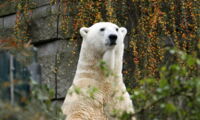
Viruses jumping species and zoo polar bear disease
Zoos bring together different animal species that would never encounter each other in the wild. On occasion, this can have unforeseen consequences. When in 2010 at the Wuppertal Zoo one polar bear died and another fell severely ill, zoo veterinarians were at a loss as to the cause of the symptoms. It has now been shown that the bears were infected with a recombinant zebra-derived virus that had jumped into other species, as reported today by an international team of researchers led by the Leibniz Institute for Zoo and Wildlife Research in the journal Current Biology. Such species-jumping viruses, if not detected, may threaten the conservation mission of zoos.

German wind farms kill bats from near and far
Local wind turbines may have large-scale negative effects on distant ecosystems. Results of research by the Leibniz Institute for Zoo and Wildlife Research (IZW) published today demonstrate that bats killed at German wind turbines originate mostly from northeastern Europe.
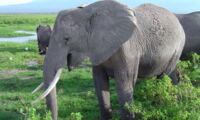
Mystery of elephant infrasounds revealed
In the current edition of "Science", an international team of voice researchers and cognitive biologists at the University of Vienna, and the Leibniz Institute for Zoo and Wildlife Research (IZW) in Berlin, Germany led by Christian Herbst, Angela Stoeger, Roland Frey and Tecumseh Fitch, provides new insights into the production of Elephant communication. The so-called "infrasounds", i.e. sounds with pitches below the range of human hearing, are found to be produced with the same physical mechanism as human speech or singing.
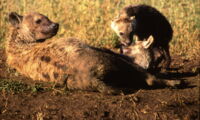
Assertiveness is the best form of defence
A new scientific study shows for the first time in spotted hyena (Crocuta crocuta) twin litters, that success in sibling competition for maternal milk is influenced by training effects, sex and hunger, and that dominant siblings exert incomplete control over their littermate’s access to the resource.
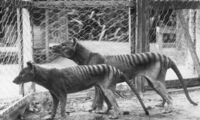
New findings document limited genetic diversity in the extinct Tasmanian tiger
Scientists have now demonstrated that the Tasmanian tiger, also known as Tasmanian wolf or thylacine, possessed limited genetic variability prior to its extinction. This might have been caused by geographical isolation when Tasmania was isolated from mainland Australia 10-13 thousand years ago.
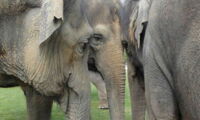
Luteal development and pregnancy in elephants
Researchers have found which mechanisms are responsible that elephants have the longest pregnancy in the world. With up to 680 days their pregnancy is longer than in any other mammal studied so far.
Bats fill mixed fuel
During autumn, migratory bats use a combination of fat reserves and food to fuel their strenuous long-distance flights to the south.
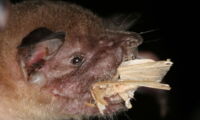
Bats: A good immune system ensures success in reproduction
Ayone who is healthy has more enthusiasm for reproduction. The same is true even for bats. Male bats with a good immune system are more successful in being selected by females during mate choice and reproduction than their ailing counterparts.




